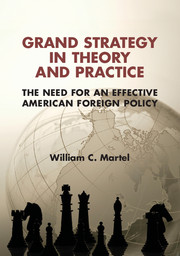Book contents
- Frontmatter
- Dedication
- Contents
- Acknowledgments
- 1 Introduction
- 2 Contemporary Classics in American Grand Strategy
- Part I Makers of Grand Strategy
- Part II Makers of American Grand Strategy
- 7 Building Domestic Foundations of American Power: Washington to Lincoln
- 8 Restraining Sources of Disorder: Theodore Roosevelt to Franklin Delano Roosevelt
- 9 Reinforcing Alliances and Partnerships: Truman to Reagan
- 10 Drifting between Principles: Bush to Obama
- Part III Conclusion
- Notes
- Index
8 - Restraining Sources of Disorder: Theodore Roosevelt to Franklin Delano Roosevelt
Published online by Cambridge University Press: 05 January 2015
- Frontmatter
- Dedication
- Contents
- Acknowledgments
- 1 Introduction
- 2 Contemporary Classics in American Grand Strategy
- Part I Makers of Grand Strategy
- Part II Makers of American Grand Strategy
- 7 Building Domestic Foundations of American Power: Washington to Lincoln
- 8 Restraining Sources of Disorder: Theodore Roosevelt to Franklin Delano Roosevelt
- 9 Reinforcing Alliances and Partnerships: Truman to Reagan
- 10 Drifting between Principles: Bush to Obama
- Part III Conclusion
- Notes
- Index
Summary
This chapter examines the United States’ rise to great power status and how that established the second principle of American grand strategy – the principle of restraining sources of disorder and acting to stabilize the system against revolutionary threats. At the turn of the century, the United States’ growing economic capacity combined with a large population and vast natural resources enabled it to become a regional and then global power. Under the leadership of Theodore Roosevelt, America began to wield greater power regionally in the Western Hemisphere through its increasing economic and military capabilities. The chapter then turns to Woodrow Wilson’s presidency, distinguished by America’s entry into World War I, Wilson’s liberal institutionalism, and the Senate’s rejection of the League of Nations. After World War I, the United States rose to great power status as the European states fell dramatically from their position at the top of the international system. World War II and its devastation of Europe perpetuated this slow rise of America and accelerated Europe’s decline. By the end of World War II, America was the world’s strongest democratic nation and the “leader of the free world.”
The Second Principle: Restraining the Sources of World Disorder and Serving as the System Stabilizer
This section examines American grand strategy in the revolutionary era, when ideological movements and other forces were seeking to transform the international system. Chapter 6 covered this revolutionary era of grand strategy in theory and practice. As we examine the evolution of American grand strategy against the backdrop of the revolutionary era, we shall see that the United States develops a principle in its grand strategy of restraining sources of disorder and addressing any threats to the overall stability of the international system.
- Type
- Chapter
- Information
- Grand Strategy in Theory and PracticeThe Need for an Effective American Foreign Policy, pp. 209 - 243Publisher: Cambridge University PressPrint publication year: 2015



